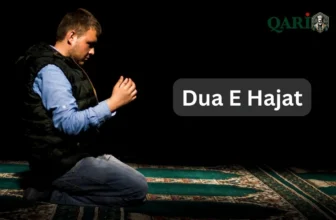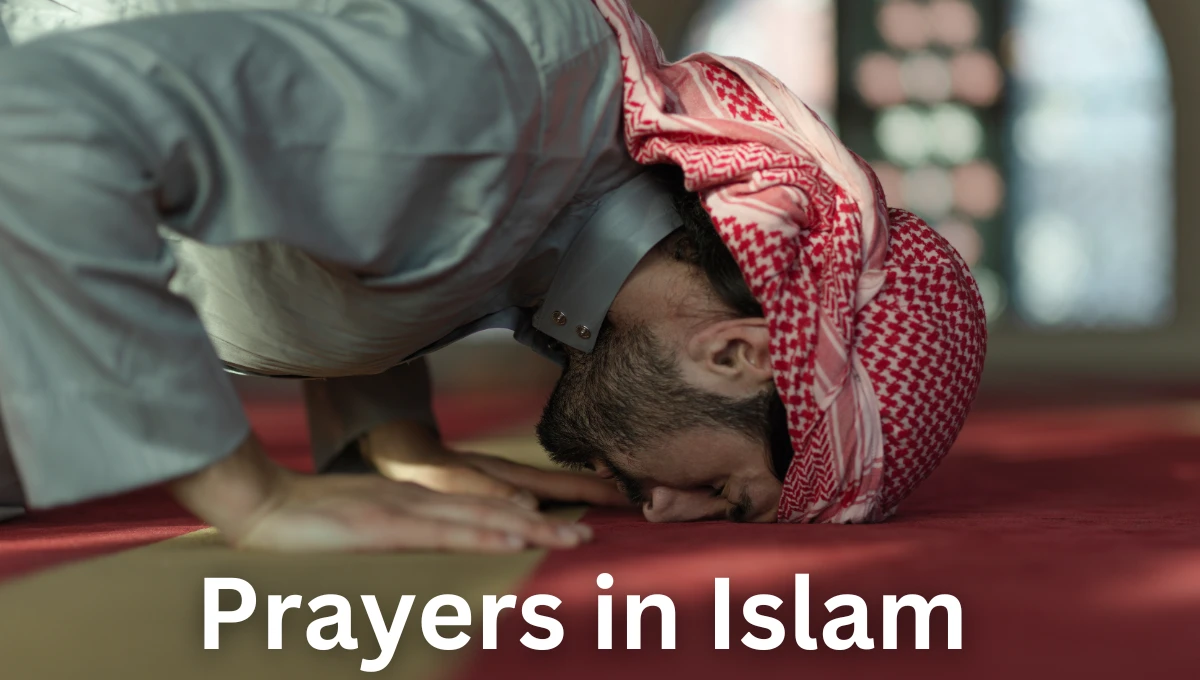
In Islam, prayers, known as “Salah,” are special moments when Muslims talk to Allah. This blog explores what these prayers mean, the main five daily prayers every Muslim performs, and why they’re so important. You’ll also learn the right way to pray, including special prayers like the ones for Eid. Plus, get insights into the core beliefs of Islam and how Muslims get ready for their prayer sessions. Join us as we dive into the spiritual heart of Islam and its prayer practices.
What do ‘Prayers in Islam’ mean through ritual prayer?
In Islam, the ritual prayer is called “Salah.” It’s a special way Muslims talk to Allah. They don’t just say anything; they follow set words and actions.
The five prayers are:
Fajr
This is the early morning prayer before the sun rises.
Dhuhr
This is the midday prayer after the sun passes its peak
Asr
This prayer is in the afternoon.
Maghrib
This is the prayer just after the sun sets.
Isha
This is the night prayer.
These prayers happen daily and help Muslims feel close to God.
If you want to learn more about islamic prayers, join our Muslim Prayers Course today.
Why is Salah important?
Salah, or the ritual prayer in Islam, is super important because it’s a direct chat between a Muslim and Allah. It helps Muslims remember Allah in their busy lives, offers a break from the day’s hustle, and keeps their hearts and actions on the right path. It’s not just about words; it’s a way to thank Allah, ask for His help, and stay connected to Him daily. So, Salah plays a big role in a Muslim’s life, helping them stay close to Allah and be better people.
ذَٰلِكَ الْكِتَابُ لَا رَيْبَ ۛ فِيهِ ۛ هُدًى لِلْمُتَّقِينَ الَّذِينَ يُؤْمِنُونَ بِالْغَيْبِ
وَيُقِيمُونَ الصَّلَاةَ وَمِمَّا رَزَقْنَاهُمْ يُنْفِقُونَ
“This is the Book in which there is no doubt, a guidance for those who have Taqwa; who believe in the unseen, and who establish Salah, and spend out of what we have provided for them” (Surah Baqarah 2: 2-3)
How to pray, Salah? Step-by-step guide
Praying Salah is a special way Muslims chat with Allah. Here’s a simple guide on how to do it:
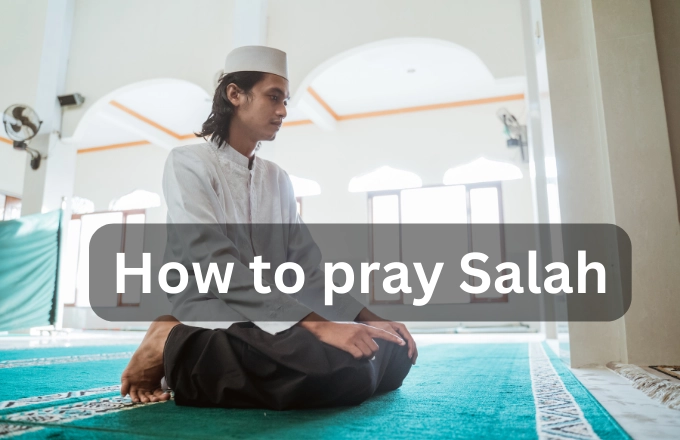
- Get Ready Wash your hands, face, arms, and feet. This washing is called “Wudu” and makes you clean for the prayer.
- Find a Quiet Spot Use a prayer mat if you have one. Make sure you’re facing Mecca (a holy place in Saudi Arabia).
- Stand Up Start your prayer by standing straight, raising both hands up near your ears, and saying “Allahu Akbar,” which means “Allah is the Greatest.”
- Recite Say verses from the Quran, starting with the opening chapter, “Al-Fatiha.
- Bow Down Bend forward with your hands on your knees. Your back and head should be level.
- Stand Up Straight Say “Allahu Akbar” again and stand straight.
- Prostrate Go down on your knees with your forehead, nose, palms, knees, and toes touching the ground. This position is called “Sujood.”
- Sit Back Sit on your legs for a moment.
- Second Prostration Do another Sujood.
- Stand Up If you’re doing more units (called “Rak’ahs”), you’ll stand up and repeat some steps. Each prayer has a different number of Rak’ahs.
- End the Prayer While sitting, you’ll say some more words of praise for Allah, asking for peace and blessings. Then, turn your head to the right and then to the left, saying “Assalamu Alaikum wa Rahmatullah,” which means “Peace and mercy of Allah be upon you.”
That’s a simple guide to Salah! Remember, it’s all about connecting with Allah, so try to focus and feel the words as you say them.
How to pray Eid Salah?
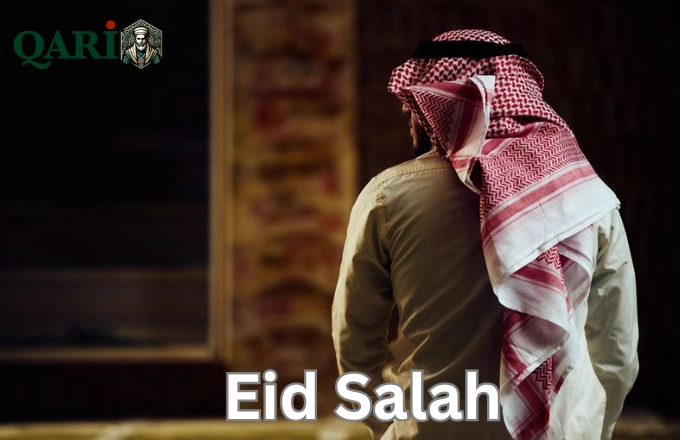
- Get Ready Wear your best clothes as it’s a celebration day! Go to a big open area or mosque where the Eid prayer is held.
- Intention Just like other prayers, start by making an intention in your heart that you’re performing Eid Salah.
- Takbir Begin the prayer with “Allahu Akbar” (Allah is the Greatest). For Eid Salah, you’ll say this extra times at the start, more than the regular prayers.
- Recite After the extra “Takbirs,” recite the Quran’s opening chapter, “Al-Fatiha,” followed by another chapter or some verses.
- Rak’ahs Eid Salah has two units or Rak’ahs. In the second Rak’ah, after saying “Allahu Akbar” and standing up, do the extra “Takbirs” again before reciting the Quran.
- Proceed as Normal After the extra “Takbirs,” continue the prayer like the normal Salah – with bowing, standing, prostrating, and sitting.
- Finish the Prayer End by turning your head to the right and saying, “Assalamu Alaikum wa Rahmatullah.”
- Listen to the Sermon After the Eid Salah, there’s usually a sermon. Stay, listen, and benefit from it.
That’s it! Remember, Eid is a day of joy and thanks to Allah, so celebrate, have fun, and share the happiness with others!
How should Muslims prepare for prayer?
Before Muslims pray, they need to get ready both physically and mentally. Physically, they do a cleaning ritual called “Wudu,” where they wash their hands, mouth, face, arms, and feet. This makes sure they’re clean when talking to Allah. Mentally, they make sure their minds are focused on the prayer and not distracted by other things.
How do Muslims perform and express reverence in the ritual prayer?
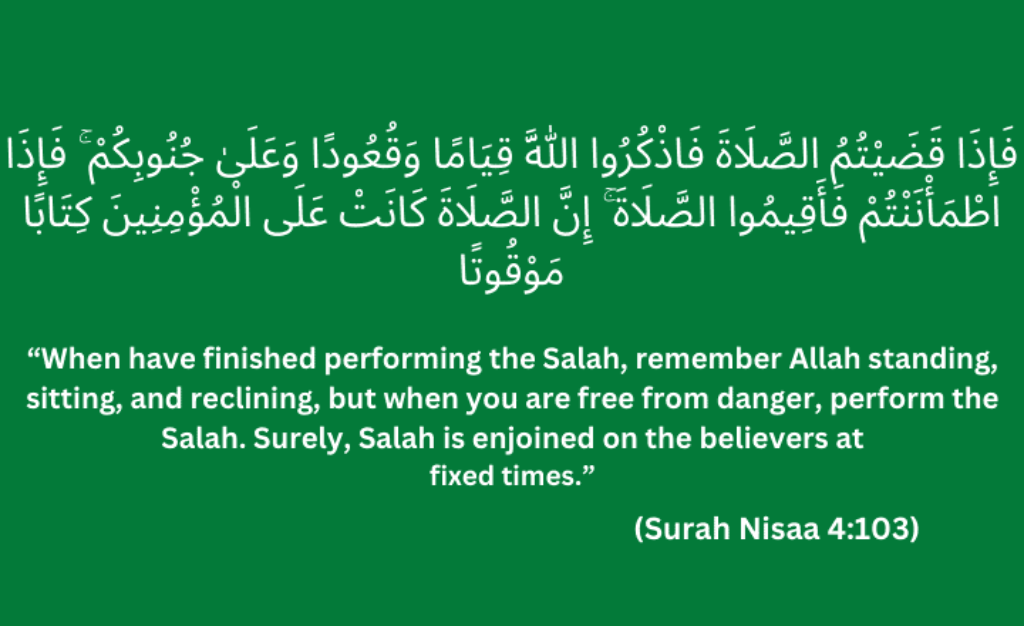
When Muslims pray, they show deep respect and love for Allah in every move. They start by standing tall, which shows readiness. Then, they bow down, lowering themselves, which shows humility. The most special part is when they completely bow down with their forehead on the ground; this position, called “Sujood,” is a sign of total respect and closeness to Allah. Through all these moves, they also recite special words and chapters from the Quran, Islam’s holy book, expressing their devotion and asking for Allah’s guidance and blessings.
Conclusion
Prayers in Islam are a sacred and powerful means of connecting with the Divine. They offer spiritual growth, discipline, and peace to those who engage in this daily practice. By understanding the significance of prayer and embracing its spiritual nature, individuals can truly develop a powerful connection with Allah.
Related Posts
Frequently Asked Questions (FAQ’s)
Q: How many times a day do Muslims pray?
Muslims pray five times a day.
Q: Can Muslims pray at any location?
Yes, Muslims can pray anywhere that’s clean.
Q: What is the significance of the call to prayer (Adhan)?
It announces prayer time and calls believers to worship.
Q: How long does a typical prayer session last?
Usually, it takes a few minutes.
Q: Can non-Muslims participate in Islamic prayers?
Non-Muslims can observe but don’t have to join in.
People also ask
1. What is the significance of prayers in Islam?
In Islam, prayers hold great importance as they are a way for Muslims to connect with Allah (God), seek guidance, and show their devotion.
2. How do Muslims establish a spiritual connection through prayers?
Muslims establish a spiritual connection through prayers by performing ritual acts of worship, reciting verses from the Quran, and focusing their hearts and minds on Allah.
3. What role do prayers play in the lives of Muslims?
Prayers play a central role in the lives of Muslims by providing a daily routine of spiritual reflection, gratitude, and seeking forgiveness, helping them stay connected to their faith.
4. Are there different types of prayers within Islam?
Yes, there are different types of prayers in Islam, including the five daily prayers (Salah), Friday prayer (Jumu’ah), special prayers during Ramadan, and various supplications for different occasions.
5. How do prayers in Islam differ from other religious practices?
Prayers in Islam stand out due to their distinctive rituals, postures, and Quranic recitations, providing a unique means for Muslims to worship and connect with Allah.






